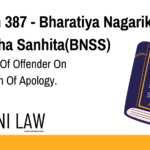Code: Section 378 BNSS
(1) Whenever any relative or friend of any person detained under the provisions
of section 369 or section 374 desires that he shall be delivered to his care and custody, the
State Government may, upon the application of such relative or friend and on his giving
security to the satisfaction of such State Government, that the person delivered shall—
(a) be properly taken care of and prevented from doing injury to himself or to
any other person;
(b) be produced for the inspection of such officer, and at such times and places,
as the State Government may direct;
(c) in the case of a person detained under sub-section (2) of section 369, be
produced when required before such Magistrate or Court,
order such person to be delivered to such relative or friend.
(2) If the person so delivered is accused of any offence, the trial of which has been
postponed by reason of his being of unsound mind and incapable of making his defence,
and the inspecting officer referred to in clause (b) of sub-section (1), certifies at any time to
the Magistrate or Court that such person is capable of making his defence, such Magistrate
or Court shall call upon the relative or friend to whom such accused was delivered to
produce him before the Magistrate or Court; and, upon such production the Magistrate or
Court shall proceed in accordance with the provisions of section 371, and the certificate of
the inspecting officer shall be receivable as evidence.
Explanation of Section 378 BNSS
Section 378 of the Bharatiya Nagarik Suraksha Sanhita (BNSS) governs the process of delivering a person with mental illness to the care of a relative or friend. This section outlines the conditions under which a person who has been detained under Section 369 or Section 374 can be handed over to the care of their relative or friend.
Upon the application of a relative or friend, the State Government may allow the individual to be released into their custody, provided that the relative or friend gives security to ensure that the individual will be properly cared for and that they will not pose a risk to themselves or others. The person must also be made available for inspection by an officer as directed by the State Government.
In the case where the person is accused of an offence but has been unable to defend themselves due to their mental illness, if the inspecting officer later certifies that the person is now capable of defending themselves, the relative or friend is required to present the person to the Magistrate or Court. The Magistrate or Court will then proceed with the case in accordance with the provisions of Section 371 BNSS.
Illustration
Example 1: Delivery to Relative or Friend
A person with mental illness, who was detained under Section 369, is being cared for in a mental health facility. Their relative applies to the State Government for their release into their care. The relative provides sufficient security, and the State Government allows the individual to be transferred to their care, with the understanding that the individual will be regularly inspected and kept under supervision.
Example 2: Postponed Trial Due to Mental Illness
A person accused of an offence is unable to defend themselves because of their mental illness, and their trial is postponed. After receiving treatment, the inspecting officer certifies that the person is now capable of defending themselves. The Magistrate then orders the relative, who has been caring for the individual, to bring the accused to court, and the trial proceeds as per Section 371 BNSS.
Common Questions and Answers on Section 378 BNSS
1. Can a relative or friend request to take care of a person with mental illness?
- Answer: Yes, a relative or friend may apply to the State Government to take care of the individual. They must provide security to ensure the person’s well-being and compliance with any inspection requirements.
2. What security does the relative or friend need to provide?
- Answer: The relative or friend must provide security to the State Government to ensure that the individual will be well taken care of, not harm themselves or others, and will be available for inspection or future proceedings.
3. What happens if the person is later found capable of making their defence?
- Answer: If the inspecting officer certifies that the person is now capable of making their defence, the Magistrate or Court will require the relative or friend to bring the individual to court for the trial to proceed in accordance with Section 371 BNSS.
4. Can the individual be sent to a public mental health facility instead of being released into the care of a relative?
- Answer: Yes, the State Government may choose to transfer the person to a public mental health establishment rather than releasing them to a relative or friend, depending on the circumstances.
Conclusion
Section 378 BNSS provides a mechanism for the release of individuals with mental illness into the care of relatives or friends, ensuring that proper care and safety measures are in place. It also addresses the continuation of legal proceedings if the person is later found capable of making their defence, thus balancing the protection of the individual with the needs of the legal process.








